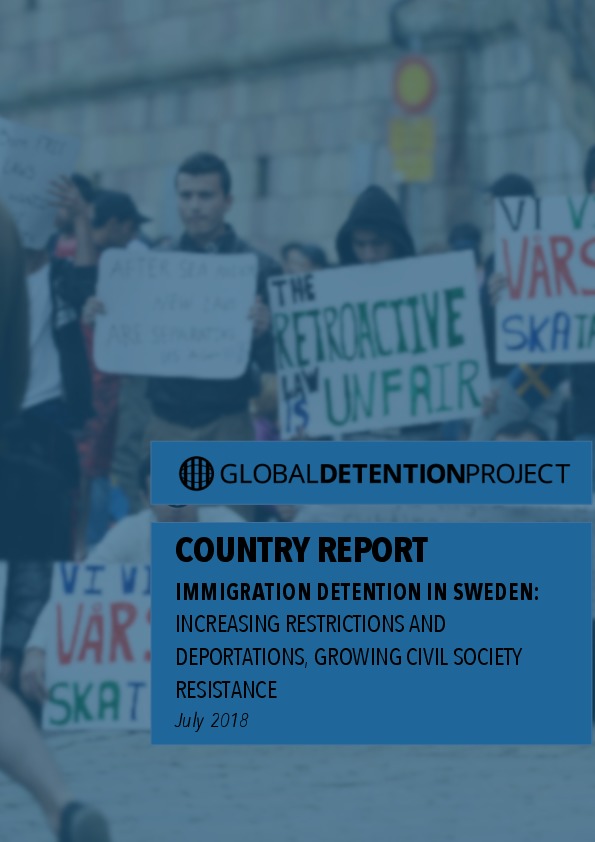Egypt has long been a destination and transit country for refugees, asylum seekers, and migrants from across the Middle East and Africa. Its Mediterranean coast has served as an important staging point for people attempting to reach Europe irregularly. Observers have repeatedly expressed concerns about Egypt’s use of police stations and prisons for immigration detention […]
Publications & Events
August 2018 Newsletter
✅ Libya’s Human Rights Crisis
✅ Limited Use of “Alternatives” in Finland
✅ GDP On The Record […]

Immigration Detention in Libya: “A Human Rights Crisis”
Libya is notoriously perilous for refugees, asylum seekers, and migrants, who often suffer a litany of abuses, including at the country’s numerous detention facilities. Conditions at these facilities, many of which are under the control of militias, are deplorable. There are frequent shortages of water and food; over-crowding is endemic; detainees can experience physical mistreatment […]

Immigration Detention in Finland: Limited Use of “Alternatives,” Restrictive Detention Review, Divisive Political Debate
Finland does not place as many migrants and asylum seekers in detention as do neighbouring Sweden and other nearby European countries. However, the country’s authorities rarely grant “alternatives to detention,” instead deeming detention to be the most efficient and cost-effective method for removing non-citizens from the country. […]

July 2018 Newsletter
Welcome to the Global Detention Project’s monthly newsletter. For any questions about our content, please contact us at: admin@globaldetentionproject.org OUR LATEST PUBLICATIONS Immigration Detention in Sweden: Increasing Restrictions and Deportations, Growing Civil Society Resistance Sweden used to be lauded for its comparatively humane treatment of asylum seekers and undocumented migrants. However, since the onset of the […]

Immigration Detention in Sweden: Increasing Restrictions and Deportations, Growing Civil Society Resistance
Sweden used to be lauded for its comparatively humane treatment of asylum seekers and undocumented migrants. However, since the onset of the “refugee crisis,” the country has introduced a series of restrictive immigration control measures and the domestic political environment has become increasingly hostile. Even as the numbers of refugee applicants have steadily fallen, the […]

Refugee Protection in a Hostile World?
Detention Centres in the Global South: The Global Detention Project at the Refugee Law Initiative Conference (London 2018) On 18-19 July, Global Detention Project Executive Director Michael Flynn and Researcher Izabella Majcher participated in the third Refugee Law Initiative Annual Conference in London. Hosted by the University of London’s School of Advanced Study, the conference reflected on the apparent […]

The Dilemmas of the International Organization for Migration
In June, Antonio Vitorino was elected Director General of the International Organization for Migration (IOM). Formerly a minister in the Portuguese government of the Socialist Prime Minister Antonio Guterres, Vitorino is only the second non-American director in the IOM’s history. Given the historical and political proximity between the IOM and the U.S. government, his election is a notable development. In this article for “The Conversation” (France), GDP Researcher Mariette Grange and Antoine Pécoud (Paris 13 University) examine the IOM’s relations with the U.S. and the organisation’s involvement in migration control “dirty work.” […]

Europe, Migrations and the Mediterranean: Human Mobilities and Intercultural Challenges
The 15th IMISCOE Annual Conference took place in Barcelona on 2-4 July 2018. Organised by the Universitat Pompeu Fabra, the conference brought together the European migration scholarship community to draw attention to geographical dimensions of migration and to provide a forum for methodological discussions linking Mediterranean and migration studies. GDP Researcher Izabella Majcher gave a presentation on data […]
Submission to the UN Committee on the Rights of the Child: Niger
Niger has long been a country of origin as well as of transit. More recently, there has been a steady flow of return migration as well as evacuations from North Africa. In its humanitarian plan for Niger for 2018, UNICEF explains that “Multi-sectoral humanitarian interventions will cover new areas, including those affected by the Malian border crisis and locations registering increasing numbers of vulnerable migrant children returning from Algeria and Libya.” […]



